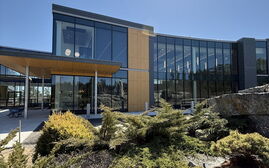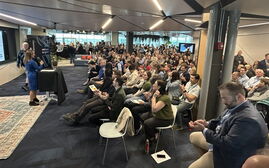
How to forge partnerships that boost Maine's economy

Maine has no shortage of talent, creativity, or gritty ambition. But what often limits our growth isn’t capacity — it’s connection. Too many employers, educators and community leaders are working hard in silos, when the real breakthroughs happen at the intersections.
Forging intentional partnerships is one of the fastest ways to grow Maine’s economy.
Whether you’re an employer looking for talent, a startup founder searching for resources, or a nonprofit leader building community, collaboration is no longer optional.
Here are five ways Maine organizations can build partnerships that deliver real impact.
Start with shared goals, not vague goodwill
Two degrees of separation in Maine is real — and almost anyone will grab a cup of coffee with you. But how do you turn that introductory meeting into something meaningful?
The strongest partnerships are built on a clear, measurable objective. “Let’s collaborate” is a weak starting point.
“Let’s increase the number of skilled trades apprentices by 20 percent over the next three years” creates accountability and focus.
In Maine, where resources are limited and geography can be challenging, partnerships without clarity fizzle. Before you sign a memorandum of understanding or announce a joint program, define the win for each partner and for the broader community.
Bridge business and education
Employers often say they can’t find the workers they need. Educators often say their graduates struggle to find jobs. The gap isn’t in supply; it’s in coordination.
Some of Maine’s most effective partnerships connect classrooms with companies, like for example Junior Achievement of Maine and Jobs for Maine Graduates.
Other examples include hospitals co-designing curricula with nursing programs or manufacturers offering apprenticeships tied directly to coursework at community colleges. These efforts do more than train students — they anchor them in Maine’s economy.
Last year, Waterville High School hosted a Focus Day where each teacher had various business partners co-teach with them to demonstrate to students the direct connection between current classroom curriculum and careers in Maine. They had 60 business people in classrooms throughout the day.
Employers and schools who take the initiative to shape curricula or host job-shadowing days aren’t just helping students; they’re shaping their future workforce.
Don’t overlook rural strengths
While Portland often gets the headlines, rural Maine has unique assets: renewable energy projects, aquaculture innovation and advanced forestry.
Partnerships that bridge urban and rural regions spread opportunity more equitably and open new markets.
Leverage nonprofits as connectors
Nonprofits and trade associations often play an underrated role as conveners. They can gather employers, educators and policymakers in ways individual businesses cannot.
Organizations like Educate Maine, the Maine State Chamber of Commerce, Startup Maine, Bioscience Association of Maine and Maine International Trade Center are trusted platforms where unusual alliances can form.
Savvy employers don’t just join these groups; they actively participate, knowing that influence and opportunity flow from engagement.
Celebrate wins and scale what works
One reason partnerships fail to gain momentum is that successes aren’t shared.
If your company launches a joint apprenticeship program with a college, tell that story in the press, at conferences and with policymakers.
Celebrating small wins builds momentum and attracts new partners. Mainers are humble — but make sure to brag about accomplishments every now and then.
Equally important: when you find something that works, replicate it. A successful internship-to-hire pipeline in one region could be adapted for others. Scaling doesn’t always require more money — sometimes it just requires sharing a model.
Multiplier effect
Maine’s economy is too dependent on collaboration for any one sector to go it alone. When we forge partnerships with shared goals, cross the urban-rural divide, engage educators and nonprofits and shine a light on what works, we multiply impact.
The future of Maine’s economy won’t be written by isolated efforts. It will be written at the intentional intersections where business, education and community come together to build something bigger than any one of us could achieve alone.














0 Comments